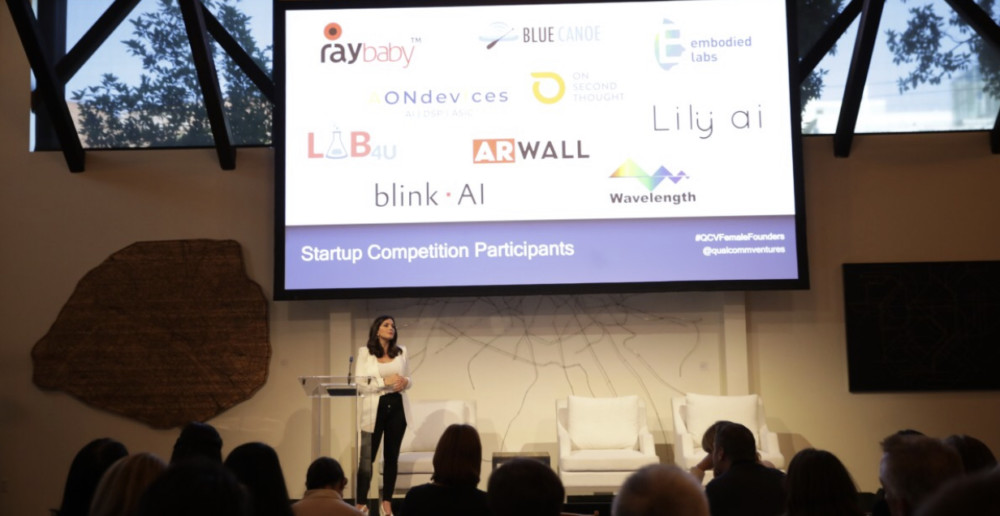By Mike Freeman
The San Diego Union-Tribune
WWR Article Summary (tl;dr) Qualcomm Ventures’ first Female Founders Summit pitch competition awarded “Blue Canoe” $500,000. The “Blue Canoe” mobile app uses speech recognition and artificial intelligence to help non-native English speakers improve their pronunciation when speaking.
The San Diego Union-Tribune
Sarah Daniels has founded or co-founded five startups since 1992. So she is well versed in the hurdles that female entrepreneurs face when pitching their young companies to potential investors.
Earlier this month, she cleared those hurdles one more time when her latest startup, Blue Canoe Learning, won Qualcomm Ventures’ first Female Founders Summit pitch competition.
The invite-only contest brought together 10 U.S.-based, early-stage technology companies with at least one female founder.
The women pitched their startups to Qualcomm Ventures, the corporate venture capital arm of the San Diego cellular technology giant, as well as others in an event held in San Francisco.
The winner took home a $500,000 investment from Qualcomm Ventures, which hopes to make the competition an annual event.
Blue Canoe uses speech recognition and artificial intelligence technology in a mobile app that helps non-native English speakers improve their pronunciation when speaking.
“English is the common language of business,” said Daniels. “There are many solutions out there that help people learn the vocabulary and grammar, but it is a classic last-mile problem to learn to speak English in a way that is clear enough that everybody will listen.”
Women-run startups pulled in just 2.2 percent of the $130 billion of venture capital money invested last year, according to research firm Pitchbook.
This gender gap in funding was one of the reasons why Qualcomm Ventures put on the Female Founders Summit.
“We recognize in the fields that we invest in — these deep technology areas like artificial intelligence, Internet of Things and autonomous cars — there are fewer female-founded startups in those sectors,” said Quinn Li, global head of Qualcomm Ventures. “We recognize there is an issue here. We are trying to do our part to promote these companies.”
Beyond investing in Blue Canoe, Qualcomm also tried to connect the 10 finalists in the competition with partner companies. Executives from Nasdaq, Silicon Valley Bank, DLA Piper, Amazon, consulting firm McKinsey, First Round Capital, Venture Partners and Microsoft’s M12 venture fund attended the event.
“I heard the pitches for all 10 companies and I was impressed not only with the inventiveness and the creativity of the ideas but also the economic possibilities,” said Susie Armstrong, a vice president of engineering at Qualcomm. “We are very interested to see if we can do this kind of event again.”
The reasons behind the funding gap for women-run firms is unclear. Some believe it stems from the fact that fewer women opt for careers in technology fields that garner the bulk of venture capital investment.
But Daniels, the Blue Canoe co-founder, doesn’t see a lack of women in technology as the top problem. “There are an incredible number of smart, creative, brilliant women founders out there in all types of fields, including deep tech or education or anything else,” she said.
Daniels pointed to a 2017 Harvard Business Review study that analyzed questions that venture capitalists asked nearly 200 startups during the TechCrunch Disrupt funding competition that year.
The study found that start-ups founded by men got more promotional questions focused on the growth potential of their businesses. Meanwhile, women entrepreneurs faced more questions about potential losses and how to minimize risks.
Male-founded start-ups raised significantly more money on average than the women run-companies at the event. The researchers believe there is a clear link between the types of questions an entrepreneur was asked and the amount of funding he or she received.
“The ability for any founder to get above the noise and tell their story is challenging,” said Daniels. “When you are female, when you are from a minority group, when you don’t look like what investors expect you to look like, you have extra hurdles to overcome. You have to figure out even more how to tell your story so it is heard. ”
Founded in late 2016, Blue Canoe has 12 employees. It customers range from Fortune 500 companies, which offer the app to employees, to global English-language education companies. It has raised nearly $4 million to date, including the new investment from Qualcomm Ventures.
Other female-founded startups that participated in the summit included AON Devices, AR Wall, BlinkAI, Embodied Labs, Lab4U, Lily AI, On Second Thought, Raybaby, and Wavelength Global.
BlinkAI, which uses machine learning to boost camera sensor performance in low-light, took second place and will receive $15,000 in free legal services from DLA Piper.
The third place finisher was Embodied Labs, which makes virtual reality training programs for professional and family caregivers. It will receive $10,000 in free legal services.
___
Distributed by Tribune Content Agency, LLC.














































































































































































































































































































































































